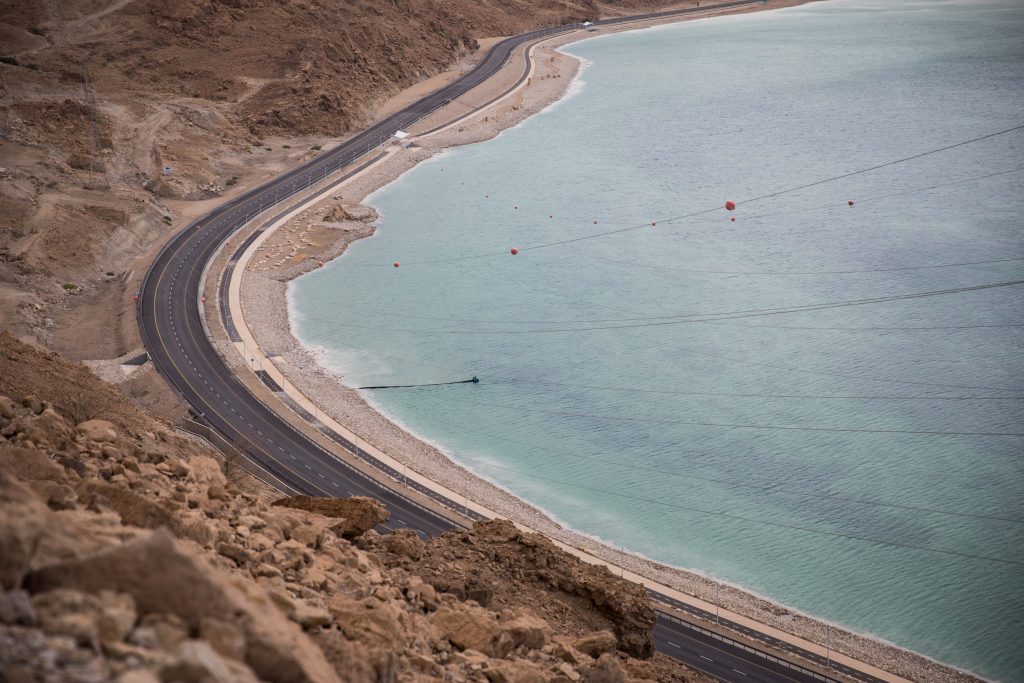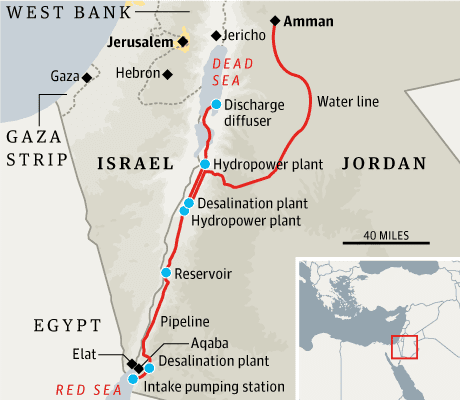The Red Sea-Dead Sea conveyance
January 5, 2019 | Expert Insights

Israel is ready to move ahead with a multibillion-dollar project with Jordan to pipe water from the Red Sea to the Dead Sea. The project was initiated in 2013 but its implementation was hampered by political tensions pertaining to the Israeli – Palestinian peace deal.
Background
The Red Sea-Dead Sea Conveyance sometimes called the Two Seas Canal, is a planned pipeline that runs from the coastal city of Aqaba by the Red Sea to the Lisan area in the Dead Sea. It will provide potable water to Jordan, Israel and the Palestinian territories, bring sea water to stabilise the Dead Sea water level and generate electricity to support the energy needs of the project. The project is going to be carried by Jordan and is entirely in Jordanian territory - financed by the government of Jordan and a number of international donors.
The connection of the seas by the canal was first suggested in the mid 19th century by British officers who were looking for ways to circumvent the French-built Suez Canal and had not realized that the level of the Dead Sea is much lower. On May 9, 2005, Jordan, Israel and the Palestinian Authority signed an agreement to go ahead with a feasibility study for the Two Seas Canal.
The project cost estimates vary from two to more than ten billion dollars depending on its structure and stages. The first phase of the Jordan Red Sea Project is expected to cost US$2.5 billion. It is expected to be financed to a large extent from commercial sources, including debt and equity and from soft international financing.

Analysis
Israel’ s regional cooperation minister, Tzachi Hanegbi said Israeli government is set to approve the multibillion-dollar project with Jordan to pipe water from the Red Sea to the Dead Sea after five years of delay.
The neighbours agreed to work together on the project in 2013, but implementation has been delayed by political tensions including stalled Israeli-Palestinian peace-making and the 2017 killing of two Jordanians by an Israeli security guard at the embassy in Amman. A 2014 World Bank feasibility study on the project said that if no action is taken, the area near the Dead Sea will suffer from further sinkholes, mud flats and landslides that will affect terrestrial and aquatic ecosystems, tourism and the chemical industry. The lake’s water level is declining by more than one meter (3.3 feet) a year.
Israel and Jordan will pledge $40 million per year to the project for 25 years, Hanegbi said, which would bring the total to at least $2 billion. Jordan is expected to exhaust its underground freshwater sources in the next 40 years, according to Mercy Corps, a global humanitarian organization. Israel sees the collaboration as a way to improve ties with Jordan, which have remained frosty despite their 1994 peace agreement.
The project could help to relieve a dire water shortage in Jordan, and Palestinians will be able to buy the desalinated water at cost, Hanegbi said. It’s also meant to alleviate the evaporation of the Dead Sea, where Jordan and Israel harvest potash and do a brisk tourism business. A hydroelectric plant will provide power to both countries. He expects the Israeli cabinet to approve the Red Sea-Dead Sea project, which will bring water from the Red Sea to a desalination centre in the Jordanian port of Aqaba. The brine by-product will be piped 200 kilometres (125 miles) north to the Dead Sea, a salt lake bordered by Jordan to the east and Israel and the West Bank to the west, whose severe shrinkage has created a slew of environmental problems.
“This is the largest joint project in the Middle East between Israel and an Arab state,” Hanegbi said. “Jordan has severe water issues and Israel wants to maintain Jordan’s stability. It’s the country with which we have our longest border.” Hanegbi described the project as something which he said is "important for regional cooperation", adding that “Prime Minister Benjamin Netanyahu was convinced that peace has a price, and he agreed to it".
Assessment
Our assessment is that this collaboration will improve Isreal's relationship with Jordan which has often been strained over Israeli policies in Jerusalem. Jordan is a custodian over Muslim sites in Jerusalem and supports the Palestinian cause. We feel that the Israeli government is likely to continue its policy of strengthening relations with its Arab neighbours to counter the influence of Iran.








Comments